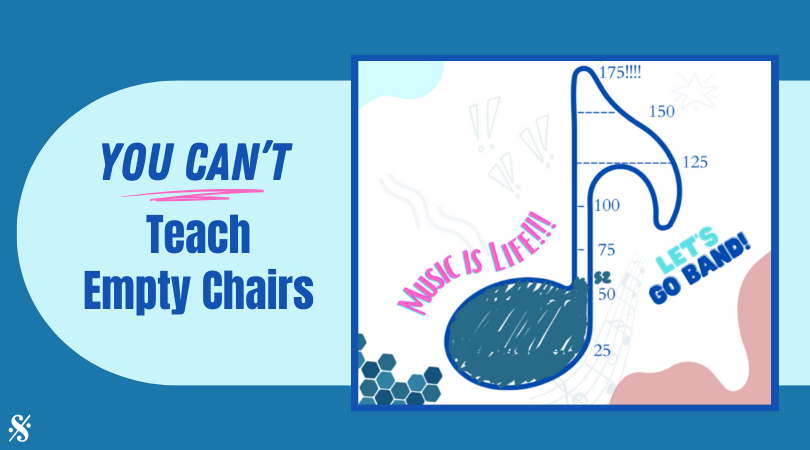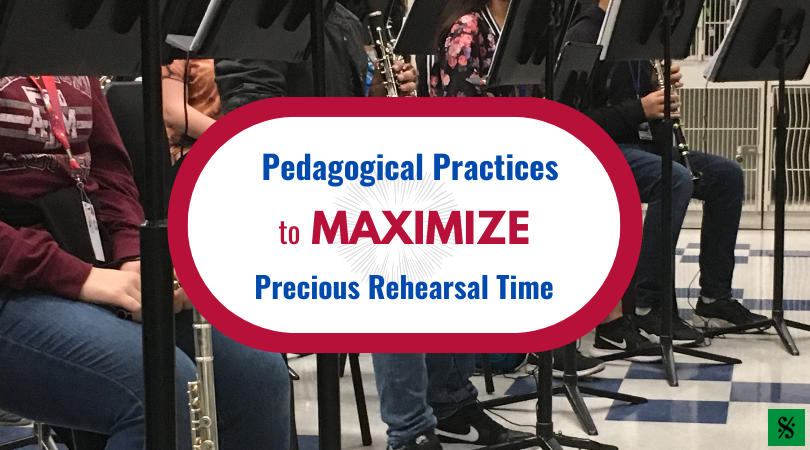As a beginning band director, I fully understand the immense responsibility I have to instruct, nurture, motivate and inspire my students. I know that everything I teach can and will have a lasting impression on my students. HOW they learn, WHAT they learn and HOW WELL they retain the information I teach them can set the groundwork for a strong foundation and many years of life-changing experiences in music. On the flip-side, if I am not providing my students with all the necessary tools for success, they can easily develop bad habits that will hold them back from their greatest potential as young musicians. No pressure, right?
We all know the first year of band instruction is the most critical. Ironically, band programs often have the least amount of rehearsal time during this stage of learning. As a result, we find ourselves cramming as many notes and rhythms into our students’ brains and hoping that they retain most of the information.
Several years ago, my band program was cut down to only a few minutes of instruction each week. The majority of my instructional time consisted of a revolving door of students coming in during their homeroom’s recess time (all at different arrival times). Because this time could not be used for traditional instruction, I had to get creative for the sake of my students and the band program. I needed something that would motivate my students to work hard without much instruction. I needed something that would motivate them to work more on their own.
WHAT WE KNOW ABOUT BEGINNING BAND STUDENTS
Students are motivated by:
- Working on something THEY like to play
- Formal recognition for their accomplishments
- Friendly competition between classmates (some students)
- Physical rewards (gifts, incentives, etc.)
- Having ownership in their learning
- Instant gratification
When I was a student many years ago, if I needed to find the answer to something, I had to go look it up in a dictionary, encyclopedia or go to the library. Our students live in the age of Google, where they can find answers quickly. As a result, when it comes to our students, QUICK SUCCESS IS THE KEY TO MOTIVATION!
WHEN YOU ARE DEALT LEMONS, MAKE LEMONADE!
After much thought and advice from my wife, a first grade teacher, I decided I needed to do something that was simple and straightforward for my students that would allow me to evaluate every student quickly and effectively. I created two levels of short scale-based technical exercises and two levels of short rhythm-based technical exercises so that I could float around the room and evaluate each student individually during the recess class in a matter of seconds. The percussionists had scale exercises and snare exercises (incorporating rhythmic concepts and rudiments). I slapped charts on the wall and instructed students to mark their own progress on the chart with stickers as they learned each exercise. I presented my students with these exercises I called “Scale and Rhythm Chunks,” made sure they knew how to find new notes in their fingering chart and told them to set specific goals for themselves. Then, basically…. it was “go time.”
In about two weeks, nearly every student in 5th grade band had mastered all ten “Chunks” in the first level and many had moved on to the second level I had given to the 6th grade band. Nearly all of the 6th grade band students had mastered the second level and requested additional levels. All of my students were playing with better tone quality, fixing bad habits and understanding notes and fingerings much more quickly. Students were having remarkable success learning at their own pace and I discovered that while I was floating around the room, many of the students had combined to help each other. I had never learned so much from teaching so little! My students had ownership in their learning. They were becoming leaders and experiencing meaningful musical growth. They even wanted to practice! Many of them began coming in on all four other recess days to practice and get their “Chunks” checked off so they could move on to the next level.
For more about motivation, innovation & differentiation in your beginning band, click here for the full 8-page handout!
Richard Canter serves as a band director for Walnut Hills High School in Cincinnati, Ohio, where he directs beginning band, junior high and high school bands. Mr. Canter is the author of the beginning band teaching supplement Scale & Rhythm Chunks, which is endorsed by Dr. Tim Lautzenheiser as “exactly what is wanted and needed…an idea whose time has come.” Mr. Canter has presented clinics throughout the United States, including the Midwest Band and Orchestra Clinic, the Texas Music Educators Association, The Texas Bandmasters Association, the University of Oregon Band Director Academy, the Georgia Music Educators Association and the Ohio Music Education Conference. Mr. Canter holds a Bachelors Degree in Music Education from Bowling Green State University and a Masters Degree in Music Education from Miami University. He resides in Cincinnati, Ohio with his wife, Kellie and two children, Lily and Andrew.
Patrick Sheridan is one of the most celebrated tuba soloists in his instrument’s history. He has performed more than 3,000 concerts in over 50 countries in venues ranging from the White House to NBA half-time shows to the Hollywood Bowl. He is a former member of US Marine Band. Mr. Sheridan has served on the music faculties at ASU, NAU, Rotterdam Conservatory, Royal Northern College of Music and Royal Scottish Academy and most recently at UCLA where he conducted the Brass Ensemble, Wind Ensemble and taught low brass. He is the co-author of the world’s best selling method for instrumental improvement, The Breathing Gym, which won the 2009 EMMY Award for Video Production. He is a Chief Design Consultant for Jupiter Band Instruments and XO Brass. Patrick is the Music Director of The Salt River Brass and works across the United States as a guest conductor with university bands and orchestras as well as high school and middle school all-state and regional honor bands and orchestras.
Related Reading:
Successful Beginner Band Pass-Offs
Connect 4 – Band Game
Open Letter to Parents Regarding Step-Up Instruments
If you would like to receive our weekly newsletter, sign up here.
Don’t forget to like us on Facebook too!
Learn. Share. Inspire.
BandDirectorsTalkShop.com







Leave a Reply
You must be logged in to post a comment.